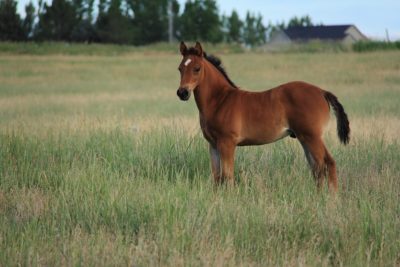Stop the Spread of Vesicular Stomatitis

Outbreaks of vesicular stomatitis (VS) occur in Texas every several years, but until this June, there were no reported cases since 2014. Because horses near Austin were recently diagnosed with this disease, horse and livestock owners in nearby areas should take precautions to keep their animals safe.
VS is a highly-contagious zoonotic disease that causes blisters in the mouth, tongue, teat, or hooves; crusty sores around the muzzle or hooves; and excessive salivation in horses and livestock, according to Dr. Michelle Coleman, assistant professor of large animal internal medicine at the Texas A&M College of Veterinary Medicine & Biomedical Sciences.
While this viral disease can affect horses, cattle, sheep, goats, and other livestock, on rare occasions, the disease can spread to people and cause flu-like symptoms, though VS is not highly contagious to humans.
“The virus can be spread through direct contact with infected animals, through saliva that can contaminate the environment, or by blood-feeding insects,” Coleman said. “People handling sick animals should wear gloves.”
Luckily, most animals are able to recover from VS with proper treatment, which mainly involves supportive care as blisters and sores heal by ensuring that animals continue to eat, drink, and behave normally.
“Due to pain of the blisters around the mouth, horses may be reluctant to eat,” Coleman said.
While animals are being treated for VS, they should stay isolated from healthy animals to avoid spreading the disease. Owners should watch out for any new physical symptoms or behavioral changes and talk to a veterinarian if concerned.
Additionally, there are several preventative steps that livestock owners can take to keep VS from spreading to their animals.
“Strategies suggested for the prevention of this disease include control of biting insects and isolation of affected animals, which is essential to reduce the burden and spread of disease,” Coleman said.
“The Texas Animal Health Commission mandates a 14-day quarantine period from the onset of lesions in the last affected animal on any premises with suspected or confirmed VS cases,” she said.
Because of the recent VS outbreaks, it is especially important that livestock owners watch out for signs of the disease and contact a veterinarian if they suspect their animals may be ill.
If VS is caught early and treated persistently, infected animals can recover and go on to live healthy lives. If everyone does their part to prevent the spread of this disease, Texas can once again be free of vesicular stomatitis.
Pet Talk is a service of the College of Veterinary Medicine & Biomedical Sciences, Texas A&M University. Stories can be viewed on the web at vetmed.tamu.edu/news/pet-talk. Suggestions for future topics may be directed to editor@cvm.tamu.edu.


